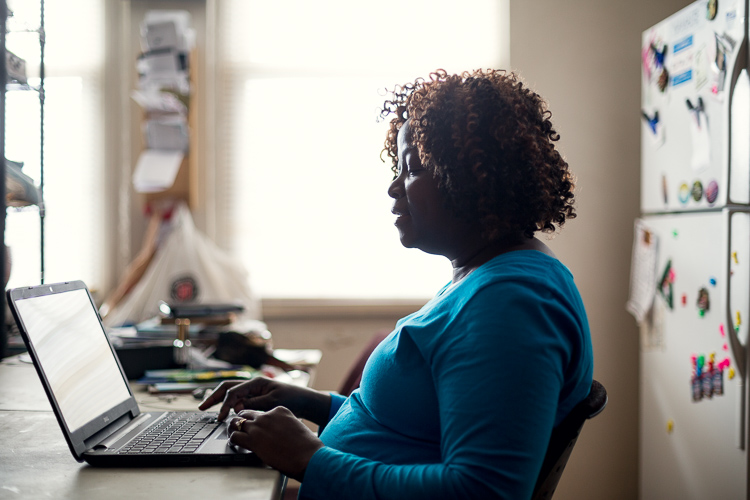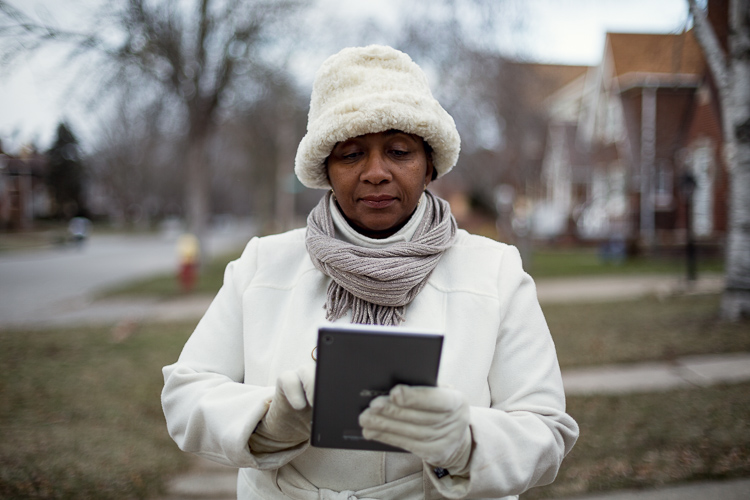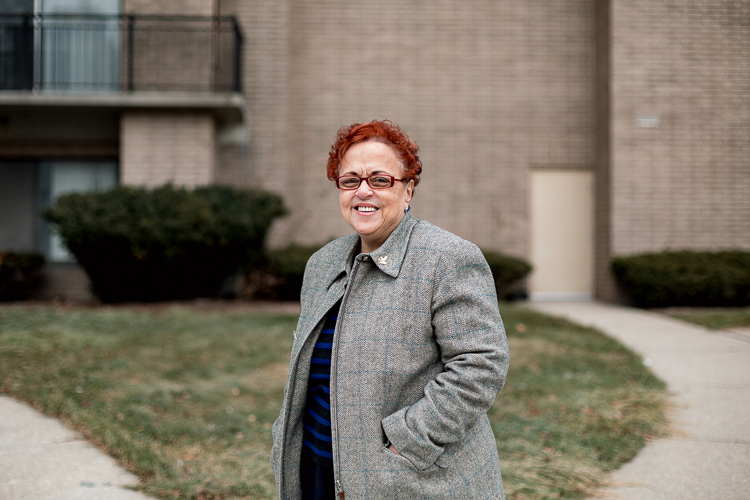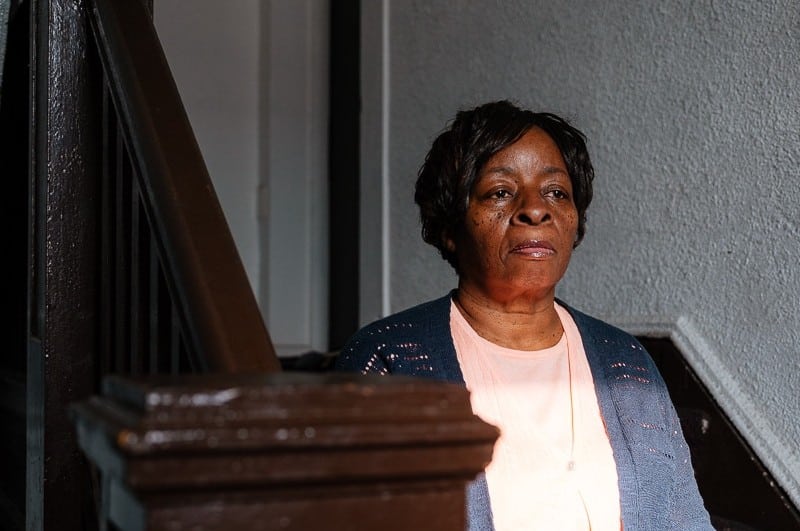Bridging Detroit’s massive digital divide
38 percent of Detroiters, and 63 percent of its low-income residents, have no home broadband. But people and organizations are helping Detroiters access the internet, and teaching them how to use it.

Norma Heath has Internet access, which puts her just barely in the majority in her Detroit neighborhood.
Heath, who lives just west of Hamtramck in Detroit’s North End neighborhood, often receives visits from a young neighbor who lacks Internet access so he can do his homework for school.
“He’ll come down to my house and say, ‘Miss Norma, can I use your Internet? I have a science project I need to do and we don’t have the computer or the Internet,'” Heath says. “What’s Norma gonna say? ‘Sure!’ I can’t tell them no.”
An informal survey conducted last summer by the North End Woodward Community Coalition (NEWCC) revealed that about 45 percent of North End residents don’t have Internet access. And according to the Federal Communications Commission, the neighborhood is unfortunately not unique in that sense. A 2015 blog by FCC chairman Tom Wheeler and FCC commissioner Mignon Clyburn described Detroit’s digital divide as “among the most extreme in the nation,” with 38 percent of city residents having no broadband at home. Narrowing the picture to low-income Detroit residents, the number of those without broadband skyrockets to 63 percent.
Since 2009, the Detroit Digital Justice Coalition (DDJC) has been pursuing a variety of initiatives to change that. The coalition, which was originally spearheaded by Detroit media strategy nonprofit Allied Media Projects (AMP), currently includes 10 Detroit-area organizations as active members. They’re united by a concept of Internet access as a human right, a means of advancing equity for individuals who would otherwise be unable to participate in modern life in a variety of ways.
DDJC member Monique Tate says that for too many Detroit residents, Internet access is still considered a luxury when it’s actually a necessity.
“They can’t afford that,” Tate says. “If children don’t have access to that tool, are not literate, and don’t know how to operate within it, you’re deprived when it comes to basic knowledge. You’re deprived when it comes to jobs. You’re deprived when it comes to society and how everything is working.”
A different kind of literacy

Limited access to technology creates another underlying problem: many Detroiters have little to no basic knowledge of how to use technology in the first place. Tate says she encounters millennials on a daily basis who know less about how to use a computer than she does—and she’s over 50 years old.
“I will state with certainty that if you are not digitally literate, you are illiterate,” she says. “There’s reading, writing, arithmetic, and technology. It belongs up there with those.”
DDJC’s members have sought to combat digital illiteracy through a variety of initiatives, many of them helped along by federal funding from the Broadband Technology Opportunities Program (BTOP). Funded through the 2009 American Recovery and Reinvestment Act, BTOP was implemented to improve broadband access nationwide. One of Tate’s first forays into digital justice work was a BTOP-funded project led by Detroit nonprofit Focus: Hope, which provided free computer training (and in many cases, free computers) to 4,000 Detroiters.
Other initiatives have been more modest. DDJC regularly hosts a fair-like event called DiscoTechs (short for “Discovering Technology”), where attendees may participate in discussions and workshops on a broad variety of technology-related topics. Attendees might have the opportunity to chat with experts about how to fix or rebuild a computer, how to use various online resources, or how to create a wireless network for their community.
“[The Internet] is something that is almost mystical for a lot of us,” says AMP executive director and DDJC member Jeanette Lee. “It just arrives in our devices and connects us to the rest of the world. A lot of the work we’re doing is to demystify the Internet’s actual architecture.”
Recently DDJC members have also worked to address situations in which expanded data access actually works to the detriment of the populations the coalition is trying to help. A key example is the city of Detroit’s open data portal, which launched in 2015 and has made a broad variety of city data available online for the first time. DDJC member Jessica McInchak says the resultant increased ease of access to property data has both pros and cons.
“As community organizers, maybe in the block club or in a neighborhood group, we can understand who owns and who’s buying properties around us, and specifically if there are properties in the neighborhood that are abandoned or not being taken care of,” she says. “But the flipside of that is this real fear that it’s making it that much more possible for big developers and companies to very quickly buy up huge tracts of land.”
Accordingly, recent DiscoTechs have focused on explaining the benefits and risks of open data and how communities can use it to their greatest advantage.
“It comes back to that idea of what access actually means for the portal and who users are,” McInchak says. “If there isn’t actually an engagement plan around the portal, it’s just sort of this thing that sits online.”
Opportunity through access

Although digital literacy has been and remains a major component of digital justice efforts in Detroit, Tate says its importance has decreased somewhat. While the number of groups offering literacy training has grown over time, that doesn’t change the fact that a huge portion of Detroit’s population still can’t afford a computer and utilize those literacy skills at home. She describes literacy as one element of a three-pronged approach to digital justice, the other two being Internet access and access to computers or other equipment.
The equipment part of the equation is a tough nut to crack given the costs involved, but DDJC is currently stepping up some long-running efforts to improve neighborhood Internet access. When the coalition was awarded $1.2 million in BTOP funding in 2010, one of the key initiatives that arose over the three-year funding period was a program known as Digital Stewards. The program trained small business owners, organizers, and other community leaders to build wireless mesh networks, which allow the signal from a single Internet connection to be spread across a broader area.
Tate, a Digital Stewards alum, has participated in the creation of two mesh networks in her neighborhood of MorningSide.
“They don’t serve enough, but they serve at least a block or two individually,” she says.
One of DDJC’s newest projects is aimed at taking community wireless networks to the next level in three Detroit neighborhoods. Launched this summer, the Equitable Internet Initiative (EII) will introduce ultra-high-speed gigabit Internet into the Southwest, Southeast, and North End neighborhoods. DDJC and AMP are partnering with a different organization in each community, including two churches and a community radio station. Lee says those organizations will serve as community hubs for high-speed Internet, while also sharing their connection with homes and businesses in their vicinities.
Joan Ross is spearheading EII in the North End as director of NEWCC and acting station manager of WNUC 96.7 FM, which will house the neighborhood’s gigabit Internet connection. Ross describes EII as an “incredibly big” development for the neighborhood, which she says has been “really, really left out in this digital movement.” She also notes that the Internet connection itself is just one component of the EII program, which also emphasizes Digital Steward training for neighborhood residents and includes an app development training component for young people in each neighborhood.
Ross envisions even more possibilities beyond that, including creating some sort of social enterprise to continue advancing Internet access or installing solar panels to run a community network.
“Once we start this conversation, it’s just wide open,” she says. “It’s just incredible how many things we can begin to bring into community with this access, with just this small opportunity which may seem little.”
Tate says that’s basically digital justice in a nutshell: expanding opportunity one person, one class, one connection at a time.
“It’s not just about sharing land or sharing food, as people had done in the past in order to survive,” she says. “This is about sharing your technology, your knowledge, your access to the Internet, and even your equipment until people are able to build their own or acquire their own.”
This piece is part of a solutions journalism series on Metro Detroit’s regional issues, conducted in partnership with Metro Matters and guided by our Emerging Leaders Board.
This work is funded by the Community Foundation for Southeast Michigan. You can view other pieces in this series here.
All photos by Nick Hagen.




